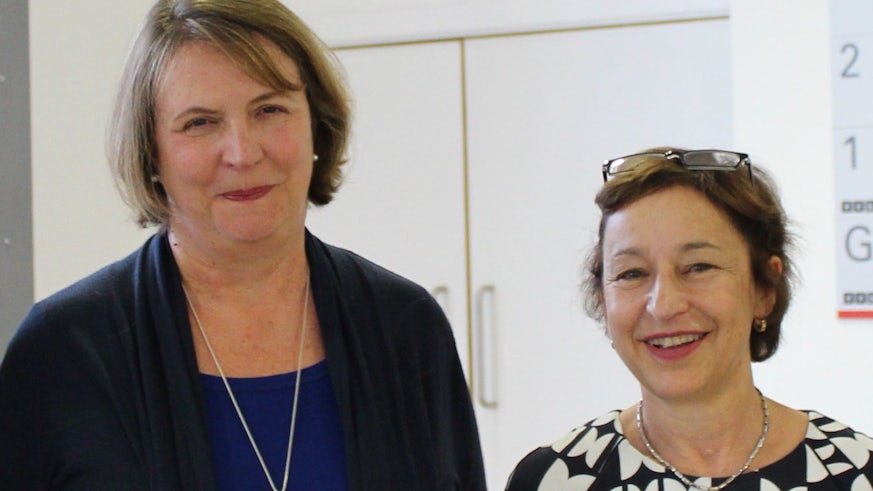Dyspraxia- the Cinderella of developmental disorders
4 Mehefin 2018

Professor Amanda Kirby, from the University of South Wales, delivered a Public Lecture discussing Developmental Co-ordination Disorder (DCD) as part of The Waterloo Foundation (TWF) Annual Conference on May 24.
Hosted by the University’s Neuroscience and Mental Health Research Institute (NMHRI), the day consisted of a variety of academic sessions including talks from NMHRI Director Professor Jeremy Hall, Professor Mark Mon-Williams from the University of Leeds and various Waterloo Foundation funded researchers.
The evening’s lecture was open to the public and welcomed over one hundred attendees; many of who had personal experiences with DCD and several others representing organisations working with developmental disorders.
Professor Heather Stevens, Founder and Chair of TWF, introduced the talk, praising Professor Kirby’s work with families, research and her creation of online resource Box of Ideas, pushing the boundaries of research and doing things nobody had done before.
Listen to the lecture
Motor Skills
Professor Kirby began the lecture by explaining her initial reason for becoming interested in the subject was because she is the parent of a child who has DCD, Dyslexia and ADHD; resulting in her changing her career from GP to researcher.
Professor Kirby went on to explain, “Movement is important in all areas of life, quite often we forget this and we need to bring it to the forefront.
“Virtually everything we do requires motor skills, yet coordination is often the thing that’s talked about least when we’re screening for developmental disorders or developmental delay. We take movement for granted, if you can do it, it’s easy and effortless.”
Professor Kirby provided her audience with practical advice, suggesting that when thinking about motor development and learning, we need to consider the environment in which we hold the activity, the manner we present tasks and the skills that person has.
“When we’re talking about supporting a child, we can adapt the task or environment, for example using a keyboard instead of handwriting.”
Professor Kirby went on to highlight that DCD is an extremely common disorder, three or four times more common than autism spectrum disorder.
“It effects movement and coordination across all ages, across a range of intellectual abilities and it is a lifelong condition.”
DCD affects the functioning of everyday activities, impacting everyday life, from getting dressed in the morning to brushing your teeth, it is pervasive. However, the presentation and symptoms differ from case to case. They are largely dependent on whether you are required to perform certain tasks or not.
Non-Motor Impact
Over the past twenty five years, Professor Kirby’s work has examined the motor impact of DCD, but for the last fifteen years she has predominantly focused on the non-motor impact of the condition. This shift includes analysis around social and emotional difficulties and problems with executive functioning such as time management, planning and personal organisation.
Professor Kirby highlighted, “With the right support, people with DCD can be very successful in their lives.
“What we know from research is that in two thirds of cases, DCD continues into adulthood. Predictors at ages eleven to sixteen of low self-esteem, increased anxiety and bullying in children has a longer term impact in adulthood. If you have less social participation and less social opportunity, this has an impact later on.
“For example not being good at sports has social ripples in terms of ability to engage and participate in conversations.”
Professor Kirby found that anxiety levels in adults with DCD, whether employed or unemployed were the same, with around 50% suffering from abnormal anxiety levels and higher depression levels.
She went on to highlight the findings of a group in Canada and Australia who developed the Environmental Stress Hypothesis. This hypothesis exemplifies how these things interact differently for different people and although DCD is a motor coordination problem with an impact on everyday functioning and outcomes, it also has a psycho-social impact.
“DCD has lifelong impact, it’s not a childhood condition. Moving into education and employment, employers know very little about developmental disorders and have done little to support individuals of neuro diverse backgrounds.”
Practical Solutions
Professor Kirby wrapped up the lecture by drawing on the practical things people can do to improve their symptoms.
She explained, “We need to look at activities and participation not just at improving motor skills. Focus should be around the lack of participation and lack of activity.
“People should be thinking about what environmental factors they can influence, such as access to foundation groups or good sports clubs and classes, find out what’s available locally and what motivates your child, especially where there are shortages of services.”
Lastly, Professor Kirby highlighted some of what she described as the eight As, “Arm yourself with information, find aptitudes- things your kids are good at as a way around things they’re not good at, automate things where possible like getting clothes out the night before, changing the attitude of others and improving awareness is important, adapt where you can for example using keyboards, avoid problematic things like sports day.
She added, “There are so many online resources including the Movement Matters website funded by the Waterloo Foundation or Box of Ideas, which offers lots of practical strategies.
“Ultimately success needs four elements; appropriate practise, don’t sweat the small stuff, do plan for the long term, prepare for times of transition and minimise longer term impact with things like physical activity getting imbedded into school earlier.
“We need to ensure health, education, locality and family and friends work together moving forward.
“I believe movement is important in all aspects of life and DCD is more than just related to movement, therefore this can have a long term impact on individuals and families.”
